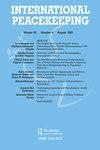In Memory of Peacekeepers: Belgian Blue Helmets and Belgian Politics
IF 1.3
2区 社会学
Q2 INTERNATIONAL RELATIONS
引用次数: 1
Abstract
ABSTRACT This article explores the interactions between the memories of Belgian peacekeepers killed in the 1994 genocide in Rwanda, the weight of the colonial past, and the Belgian foreign policy. Using interviews with Belgian politicians and diplomats, families of peacekeepers, former blue helmets, as well as a corpus of official speeches, this article finds that the memorialization of blue helmets has influenced Belgian political choices on three levels, namely: domestic politics, its bilateral relationship with Rwanda, and more broadly its position in international peacekeeping. In doing so, this article contributes to interdisciplinary debates on the role of collective memory in domestic and international politics.纪念维和人员:比利时蓝盔与比利时政治
本文探讨了1994年卢旺达大屠杀中牺牲的比利时维和人员的记忆、殖民历史的重要性以及比利时外交政策之间的相互作用。通过对比利时政治家和外交官、维和人员家属、前蓝盔人员以及官方讲话的采访,本文发现,纪念蓝盔人员在三个层面上影响了比利时的政治选择,即:国内政治、与卢旺达的双边关系,以及更广泛地说,比利时在国际维和行动中的立场。在这样做的过程中,本文有助于跨学科讨论集体记忆在国内和国际政治中的作用。
本文章由计算机程序翻译,如有差异,请以英文原文为准。
求助全文
约1分钟内获得全文
求助全文

 求助内容:
求助内容: 应助结果提醒方式:
应助结果提醒方式:


